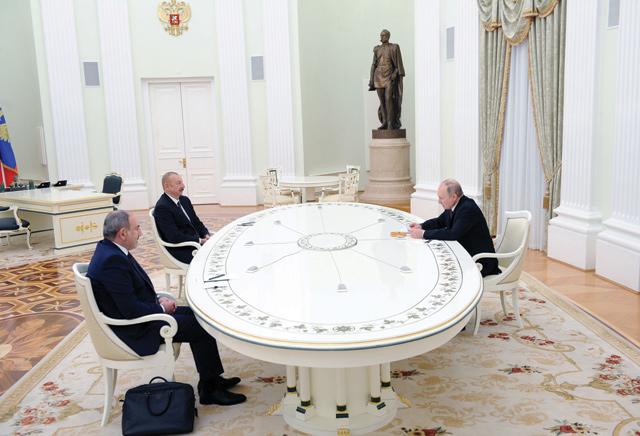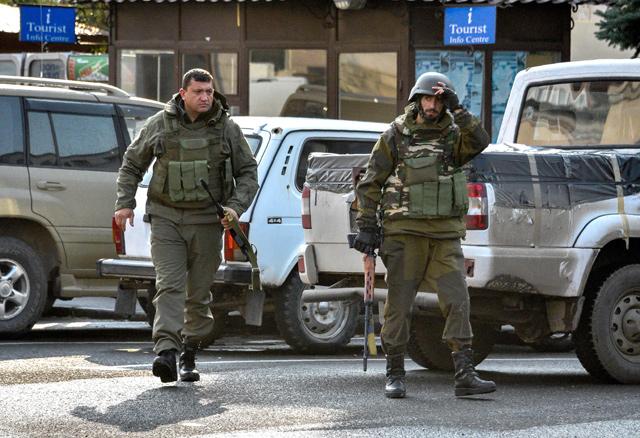You are here
Nagorno-Karabakh truce holds, but residents fear renewed violence
By Reuters - Apr 06,2016 - Last updated at Apr 06,2016

A tank of the self-defence army of Nagorno-Karabakh moves on the road near the village of Mataghis, on Wednesday (Reuters photo)
TALYSH, Azerbaijan — Elmira Bagiryan, a resident of a village at the epicentre of four days of fighting between Azerbaijan and ethnic Armenian forces, was leaving even though the gunfire had stopped.
"We are afraid that the shooting will begin again," she said as she prepared to board a car laden with carpets, pillows, blankets and furniture from her home.
The village of Talysh was briefly occupied by Azeri troops during four days of battles over Azerbaijan's breakaway Nagorno-Karabakh region which subsided on Tuesday afternoon when both sides agreed a ceasefire.
Russia said it had played a lead role in brokering a halt to the violence, hosting a meeting between military chiefs from Armenia and Azerbaijan.
The fighting was the most intense since a war over Nagorno-Karabakh in the early 1990s, and raised fears of a return to all-out war in a region that serves as a corridor for pipelines taking oil and gas to world markets.
The guns had fallen silent in Talysh, a few kilometres from the Azeri town of Barda on the northernmost edge of separatist-held territory, on Wednesday afternoon. Ethnic Armenian troops, firmly back in control, milled around, smiling.
There were signs, though, of the ferocity of the fighting of previous days. Several houses had been destroyed by shell fire. The hulk of a burned out car lay by the road. Nearby were the carcasses of several dead cows.
Bagiryan, a grey-haired ethnic Armenian in her early 60s, said three villagers had been killed.
Close to tears, she said she had spent days and nights in the cellar of a neighbour's house, taking refuge from the shelling.
Quiet had returned on Tuesday when the ceasefire was agreed, but she planned to leave all the same.
Other residents also were using the lull as an opportunity to get out. On the roads in the area, cars and trucks loaded with belongings were heading away from the front line.
Old tensions erupt
The previous war between the two ex-Soviet states killed thousands on both sides and displaced hundreds of thousands.
It ended with a truce in 1994, although there have been sporadic flare-ups since. The ceasefire was shattered over the weekend, with Azerbaijan's army and the Armenian-backed separatists of Nagorno-Karabakh exchanging heavy fire using artillery, tanks, rocket systems and helicopters. Dozens of soldiers were killed.
Azerbaijan's armed forces said they had seized patches of territory from the separatists, among them the Leletepe Heights, on the southeastern side of the conflict zone towards the border with Iran.
On Wednesday, an Azeri flag was flying on the mountain and underfoot were spent bullet casings. No shooting could be heard, according to a Reuters reporter who visited the spot.
Azeri officials said the ethnic Armenian forces, before they were dislodged, had been using the heights to launch artillery strikes on Azeri villages.
Russian role
Speaking at a meeting in Berlin with Armenia's president, German Chancellor Angela Merkel said urgent efforts were needed to make sure the ceasefire would last.
"Above all, everything must be done such that more blood is not spilled and lives lost," Merkel said.
Mediation in the conflict has for years been assigned jointly to envoys from France, Russia and the United States. But Moscow has stepped up its diplomatic role in the past few days.
Officials from both sides said the truce was agreed at a meeting in Moscow between the chiefs of staff of the Azeri and Armenian militaries. The Kremlin said Russian President Vladimir Putin had telephoned the leaders of Azerbaijan and Armenia to urge them to agree a ceasefire.
Meanwhile, Russian Prime Minister Dmitry Medvedev and Foreign Minister Sergei Lavrov were both heading to Azerbaijan's capital, Baku, in the next few days.
Russia does not have the same direct interest in the Nagorno-Karabakh conflict as it does in other territorial disputes in the former Soviet Union. In Georgia and Ukraine, it provided direct support to separatists.
However, its active diplomacy over the past few days is consistent with a push by the Kremlin to assert its influence, especially in places where the administration of US President Barack Obama has elected to take a more low-key role.
Related Articles
MOSCOW, Russia — Russian President Vladimir Putin hosted the leaders of Armenia and Azerbaijan on Monday as he urged the arch-enemies to neg
YEREVAN — Armenia said on Monday that fighting was continuing for the key town of Shusha in Nagorno-Karabakh, a day after Azerbaijan claimed
YEREVAN — Armenia accused Azerbaijan on Tuesday of injuring one of its soldiers in a shootout, the latest incident between the Caucasus coun


















